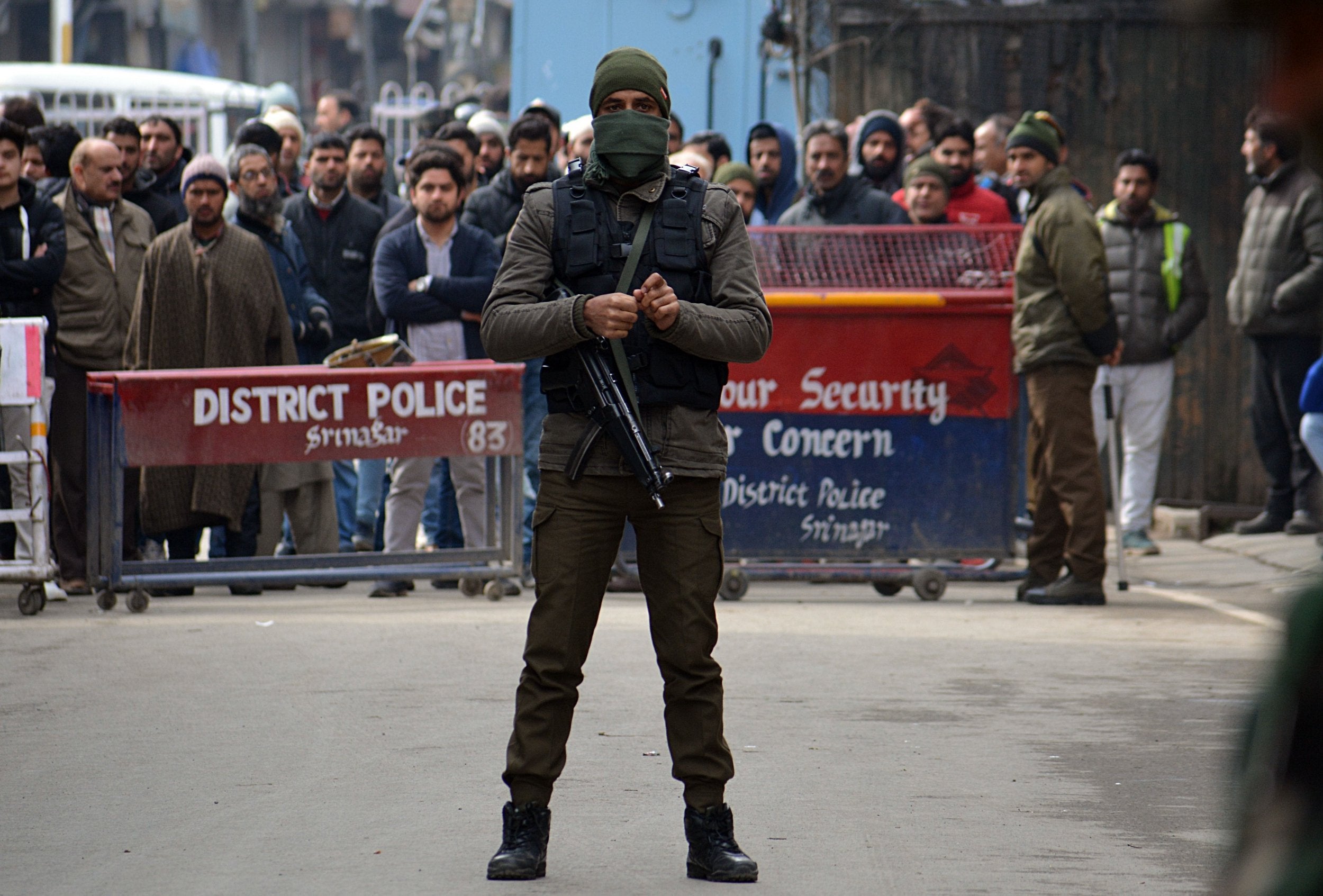Is War Inevitable? Examining The Kashmir Factor In India-Pakistan Relations

Table of Contents
Historical Roots of the Kashmir Conflict
The Kashmir dispute is deeply rooted in the tumultuous Partition of India in 1947. The princely state of Jammu and Kashmir, possessing a predominantly Muslim population but ruled by a Hindu Maharaja, faced a critical decision regarding its accession. This indecision led to a complex chain of events that continues to shape the region today.
- The princely state of Jammu and Kashmir's accession to India: Following tribal incursions from Pakistan, the Maharaja acceded to India, a decision contested by Pakistan.
- The First Kashmir War (1947-48): This war solidified the division of Kashmir, establishing a Line of Control (LoC) that remains a highly contested border to this day. The conflict ended with a UN resolution calling for a plebiscite, a vote that has never been held.
- Subsequent wars (1965, 1971, Kargil War): The Kashmir dispute fueled further armed conflicts between India and Pakistan, further entrenching the divisions and escalating tensions. The 1971 war led to the creation of Bangladesh.
- The UN's involvement and resolutions: Numerous UN resolutions on Kashmir have attempted to mediate a peaceful resolution, focusing primarily on a plebiscite to determine the will of the Kashmiri people. These resolutions remain largely unimplemented.
- The Line of Control (LoC) and its significance: The LoC, a military control line separating Indian-administered Kashmir from Pakistan-administered Kashmir, is a constant source of friction and frequent site of border skirmishes. It remains a potent symbol of the unresolved Indo-Pakistani wars and the ongoing Kashmir dispute.
The Geopolitical Landscape and the Kashmir Conflict
The current geopolitical environment significantly impacts the Kashmir conflict. Several factors contribute to the ongoing instability.
- The role of external actors (e.g., China): China's growing influence in the region, particularly through the China-Pakistan Economic Corridor (CPEC), adds another layer of complexity to the Kashmir terrorism issue and increases regional tensions.
- The impact of cross-border terrorism: Cross-border terrorism emanating from Pakistan-administered Kashmir remains a major concern for India, adding fuel to the already volatile situation. This is a significant factor impacting India-Pakistan relations.
- Nuclear proliferation and its implications: Both India and Pakistan possess nuclear weapons, significantly raising the stakes of any potential conflict. The risk of military escalation in the region is incredibly high due to the presence of nuclear arsenals.
- Internal dynamics within Kashmir (e.g., separatist movements): Various separatist movements within Kashmir add to the internal complexities, demanding self-determination and challenging both Indian and Pakistani claims. This complicates the search for lasting solutions to the Kashmir issue.
- Changing demographics in Kashmir: Demographic shifts within the region, particularly in Indian-administered Kashmir, further influence the political landscape and fuel disputes over identity and representation.
Analyzing the Likelihood of War
The risk of armed conflict between India and Pakistan remains significant. Several factors contribute to this heightened risk.
- Recent military escalations and border skirmishes: Regular skirmishes and military escalations along the LoC demonstrate the fragility of peace and the potential for a rapid deterioration of the situation. These incidents highlight the need for improved Kashmir ceasefire mechanisms.
- The role of diplomacy and dialogue: While there have been periods of dialogue and diplomatic engagement, significant breakthroughs have been rare. The lack of sustained Kashmir peace talks is a concerning factor.
- The potential for miscalculation and escalation: The potential for accidental escalation or miscalculation in the context of heightened military activity along the LoC is a significant threat. The situation demands careful and measured diplomacy.
- The economic consequences of war for both nations: A full-scale war between India and Pakistan would have devastating economic consequences for both countries, impacting regional stability and global markets.
- International pressure to de-escalate: The international community plays a crucial role in exerting pressure to de-escalate tensions and promote dialogue. However, the effectiveness of this pressure remains to be seen.
Pathways to Peace and Conflict Resolution
Despite the seemingly intractable nature of the Kashmir conflict, several pathways to peace exist.
- Negotiated settlement based on UN resolutions: A negotiated settlement, possibly based on the long-standing, albeit largely unimplemented, UN resolutions, could provide a framework for a resolution.
- Confidence-building measures (CBMs): Implementing CBMs, such as enhanced communication channels and mechanisms to prevent accidental escalation, can help reduce the risk of armed conflict.
- Third-party mediation: International mediation by trusted actors could facilitate dialogue and help bridge the gap between the two sides.
- Focus on economic cooperation and people-to-people contact: Promoting economic cooperation and increasing people-to-people contact can foster mutual understanding and help break down existing barriers.
- Addressing the concerns of the Kashmiri people: Any lasting solution must address the aspirations and concerns of the Kashmiri people themselves, promoting self-determination and inclusive governance. This is crucial for a genuine and lasting Kashmir peace process.
Conclusion
The Kashmir conflict remains a critical factor in India-Pakistan relations, posing a persistent threat of war. While the historical context and current geopolitical landscape contribute to instability, potential avenues for peaceful resolution exist. Understanding the complexities of the Kashmir conflict is crucial for promoting regional stability and preventing future violence. Continued dialogue, international cooperation, and a commitment to addressing the root causes of the conflict are essential to finding a lasting solution and preventing a catastrophic war. Let's work towards a peaceful resolution to the Kashmir issue and foster lasting peace in the region.

Featured Posts
-
 Beat The Ps 5 Price Hike Secure Your Console Today
May 08, 2025
Beat The Ps 5 Price Hike Secure Your Console Today
May 08, 2025 -
 2024
May 08, 2025
2024
May 08, 2025 -
 New Ps 5 Pro Features What We Know So Far
May 08, 2025
New Ps 5 Pro Features What We Know So Far
May 08, 2025 -
 Bitcoin Madenciligi Artik Karli Degil Mi Bir Analiz
May 08, 2025
Bitcoin Madenciligi Artik Karli Degil Mi Bir Analiz
May 08, 2025 -
 Fetterman Responds To Questions About His Health After Ny Magazine Article
May 08, 2025
Fetterman Responds To Questions About His Health After Ny Magazine Article
May 08, 2025
Latest Posts
-
 Four Word Warning From Dwp Potential Benefit Cuts In The Uk
May 08, 2025
Four Word Warning From Dwp Potential Benefit Cuts In The Uk
May 08, 2025 -
 Uk Households Receive Dwp Letters Benefits Under Threat
May 08, 2025
Uk Households Receive Dwp Letters Benefits Under Threat
May 08, 2025 -
 Dwp Issues Warning Benefit Cuts Imminent For Uk Households
May 08, 2025
Dwp Issues Warning Benefit Cuts Imminent For Uk Households
May 08, 2025 -
 Dwp Benefit Stoppage Four Word Letters Warning Uk Households
May 08, 2025
Dwp Benefit Stoppage Four Word Letters Warning Uk Households
May 08, 2025 -
 Impact Of Dwps Universal Credit Overhaul What Claimants Need To Know
May 08, 2025
Impact Of Dwps Universal Credit Overhaul What Claimants Need To Know
May 08, 2025
